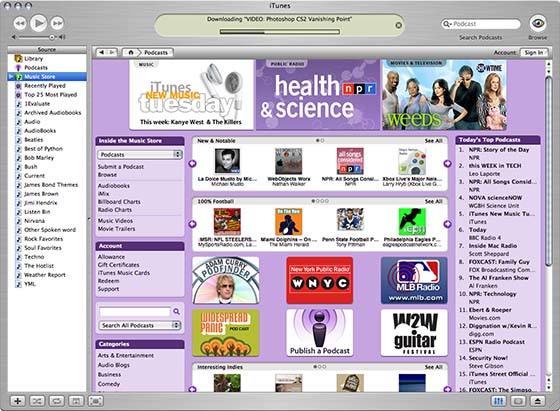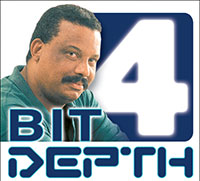BitDepth 490 - September 13
11/01/09 17:43 Filed in: BitDepth - September 2005
Podcasts flourish on the web.
From the bowels of radio

iTunes added podcast downloading in a big and decisive way with iTunes 4.9. Because iTunes can also play video, some podcast sources like Digerati University are adding video tutorials to their podcast listings.
Once Apple built podcasting into its iTunes music player, the web broadcasting officially went mainstream. It was possible prior to that move to link to popular podcasts at website aggregators like Podcast Alley, but iTunes layered a slick and accessible interface (the same one used on their music store) and some much welcome publicity, organisation and accessibility to a phenomenon that’s flourished largely in the wild and needed some cultivating.
The strategy has been wildly successful. Within 48 hours of the podcast savvy version of iTunes, Apple claims that more than a million podcast subscriptions had been registered. The site now offers more than 15,000 podcasts for download.
A podcast is an audio file, usually in the popular MP3 format, with content that tends to resemble traditional talk radio. But freed of the need to please sponsors, pay obeisance to the rules of public broadcasting or even to attract an audience, most podcasts range wild and free.
The term itself is a catchy mashup of broadcasting and iPod, one of the digital music players that’s capable of playing these digital audio distributions – and just describing them that way makes it clear why they were dubbed “podcasts” in the first place.
After listening to web-delivered talkshow files for at least eight years now, I find the enthusiasm for podcasts to be both understandable and unsurprising.
Unlike streaming radio files, a much older way of distributing audio on the Internet, podcasts don’t require you to maintain a connection to the source of the data to listen to the show. You download a file and play it back at your convenience.
iTunes makes it easy to search for podcasts that might interest you (handily labelling the more extreme files as explicit) and makes downloading them less of a geek chore.
In fact, it’s insanely easy. Select a podcast, subscribe to it and it’s downloaded to your computer and queued to be transferred to your iPod the next time you connect it.
For podcasters, the hardest part of creating a show is having something to say. With semi-professional audio software going for dinner date money, it’s possible to put together something that sounds like a radio show with a recent computer and TT$500 or less worth of microphones and sound editing software.
Unfortunately, such low-budget operations tend to sound less than inspiring and the best podcasts invest a bit more in royalty free music for bumpers or roll their own stings with software like Fruity Loops or GarageBand.
Podcasts tend to divide broadly into three groups. Professional productions that originally aired on broadcast radio and are being offered on the Internet for folks who didn’t tune in (but really, the plan is to win new listeners).
Semi-professional productions that are far too niche focused to win airplay on traditional radio stations and amateur podcasts, created by people with big lungs and shallow pockets.
Those who are new to podcasts may want to test the professional productions first to get a sense of what listening to radio on demand can be like. It’s not for everyone, since many people have grown accustomed to radio as something they tune in and out of intermittently and podcasts tend to call for a bit more focus than that.
You’ll definitely need to pay attention when you begin to explore the world of semi-professional and amateur podcasting, which ranges from the popular but raunchy Dawn and Drew Show in which a Wisconsin couple go on and on about sex and the mundane enthusiasms of domestic life to a growing collection of sermons from preachers, rabbis and pastors around the world.
There are local podcasters too. Georgia Popplewell broke ground with her Caribbean Free Radio podcast (now up to #30), and the Trinidad and Tobago Computer Society followed with a web-friendly version of their pizza-lime chat sessions.
Like blogging, much of the price of entry into podcasting has already been paid by the average computer owners and software authors are busy trying to recast or craft software to make it even easier for audio newbies to deliver listenable shows.
Music is an iffy proposition. Digital rights management limits are draconian and make it difficult to do podcasts featuring anything but independent music. You’ll also find that many podcasts are full of audio variances and “ums,” but if “your blood takes” a podcaster, it’s a little like dropping in on a friend and listening to him rant for a half an hour or so.
Podcast info on the web.
Adam Curry is credited as the podfather, the former MTV veejay who helped create iPodder, an invaluable tool for moving podcasts to a digital music player. Some podcasts are available in Windows Media Audio format and iTunes can’t (and won’t for the foreseeable future) handle those. For those files you need the original podcast management tool, iPodder, Curry’s website should be the first stop for any serious wanna-be podcaster, as is Podcast Alley, which places more emphasis on indie podcasts than the populist iTunes selections.

iTunes added podcast downloading in a big and decisive way with iTunes 4.9. Because iTunes can also play video, some podcast sources like Digerati University are adding video tutorials to their podcast listings.
Once Apple built podcasting into its iTunes music player, the web broadcasting officially went mainstream. It was possible prior to that move to link to popular podcasts at website aggregators like Podcast Alley, but iTunes layered a slick and accessible interface (the same one used on their music store) and some much welcome publicity, organisation and accessibility to a phenomenon that’s flourished largely in the wild and needed some cultivating.
The strategy has been wildly successful. Within 48 hours of the podcast savvy version of iTunes, Apple claims that more than a million podcast subscriptions had been registered. The site now offers more than 15,000 podcasts for download.
A podcast is an audio file, usually in the popular MP3 format, with content that tends to resemble traditional talk radio. But freed of the need to please sponsors, pay obeisance to the rules of public broadcasting or even to attract an audience, most podcasts range wild and free.
The term itself is a catchy mashup of broadcasting and iPod, one of the digital music players that’s capable of playing these digital audio distributions – and just describing them that way makes it clear why they were dubbed “podcasts” in the first place.
After listening to web-delivered talkshow files for at least eight years now, I find the enthusiasm for podcasts to be both understandable and unsurprising.
Unlike streaming radio files, a much older way of distributing audio on the Internet, podcasts don’t require you to maintain a connection to the source of the data to listen to the show. You download a file and play it back at your convenience.
iTunes makes it easy to search for podcasts that might interest you (handily labelling the more extreme files as explicit) and makes downloading them less of a geek chore.
In fact, it’s insanely easy. Select a podcast, subscribe to it and it’s downloaded to your computer and queued to be transferred to your iPod the next time you connect it.
For podcasters, the hardest part of creating a show is having something to say. With semi-professional audio software going for dinner date money, it’s possible to put together something that sounds like a radio show with a recent computer and TT$500 or less worth of microphones and sound editing software.
Unfortunately, such low-budget operations tend to sound less than inspiring and the best podcasts invest a bit more in royalty free music for bumpers or roll their own stings with software like Fruity Loops or GarageBand.
Podcasts tend to divide broadly into three groups. Professional productions that originally aired on broadcast radio and are being offered on the Internet for folks who didn’t tune in (but really, the plan is to win new listeners).
Semi-professional productions that are far too niche focused to win airplay on traditional radio stations and amateur podcasts, created by people with big lungs and shallow pockets.
Those who are new to podcasts may want to test the professional productions first to get a sense of what listening to radio on demand can be like. It’s not for everyone, since many people have grown accustomed to radio as something they tune in and out of intermittently and podcasts tend to call for a bit more focus than that.
You’ll definitely need to pay attention when you begin to explore the world of semi-professional and amateur podcasting, which ranges from the popular but raunchy Dawn and Drew Show in which a Wisconsin couple go on and on about sex and the mundane enthusiasms of domestic life to a growing collection of sermons from preachers, rabbis and pastors around the world.
There are local podcasters too. Georgia Popplewell broke ground with her Caribbean Free Radio podcast (now up to #30), and the Trinidad and Tobago Computer Society followed with a web-friendly version of their pizza-lime chat sessions.
Like blogging, much of the price of entry into podcasting has already been paid by the average computer owners and software authors are busy trying to recast or craft software to make it even easier for audio newbies to deliver listenable shows.
Music is an iffy proposition. Digital rights management limits are draconian and make it difficult to do podcasts featuring anything but independent music. You’ll also find that many podcasts are full of audio variances and “ums,” but if “your blood takes” a podcaster, it’s a little like dropping in on a friend and listening to him rant for a half an hour or so.
Podcast info on the web.
Adam Curry is credited as the podfather, the former MTV veejay who helped create iPodder, an invaluable tool for moving podcasts to a digital music player. Some podcasts are available in Windows Media Audio format and iTunes can’t (and won’t for the foreseeable future) handle those. For those files you need the original podcast management tool, iPodder, Curry’s website should be the first stop for any serious wanna-be podcaster, as is Podcast Alley, which places more emphasis on indie podcasts than the populist iTunes selections.
blog comments powered by Disqus

